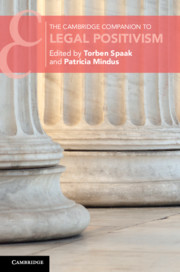Book contents
- The Cambridge Companion to Legal Positivism
- Cambridge Companions to Law
- The Cambridge Companion to Legal Positivism
- Copyright page
- Contents
- Figures
- Contributors
- Acknowledgements
- 1 Introduction
- Part I Fundamentals
- Part II History
- Part III Central Figures
- Part IV Main Tenets
- Part V Normativity and Values
- Part VI Critique
- Index
- References
1 - Introduction
Published online by Cambridge University Press: 21 January 2021
- The Cambridge Companion to Legal Positivism
- Cambridge Companions to Law
- The Cambridge Companion to Legal Positivism
- Copyright page
- Contents
- Figures
- Contributors
- Acknowledgements
- 1 Introduction
- Part I Fundamentals
- Part II History
- Part III Central Figures
- Part IV Main Tenets
- Part V Normativity and Values
- Part VI Critique
- Index
- References
Summary
Much has been said about legal positivism. Yet, given the lack of clarity as to what, exactly, it stands, or should stand, for, more is to be said, not only about what legal positivism is, or might be, and its different types but also about its different geographical traditions, central figures, fundamental tenets, meta-ethical underpinnings, if any, the problem of legal normativity considered within the framework of legal positivism, the value or disvalue of law positivistically conceived and of positivistic legal arrangements, and, of course, about the perceived problems of legal positivism, such as its alleged totalitarian implications. This is what this book does and this Introduction explains how. We attempt to provide a fuller and more adequate characterisation of legal positivism than just saying that legal positivists reject the view that there is a necessary connection between law and morality, and we identify certain important types of legal positivism. What is offered in this volume is a rather comprehensive and systematic discussion by experts in the field; this Introduction thus also illustrates the authors’ contributions to the various topics examined.
Keywords
- Type
- Chapter
- Information
- The Cambridge Companion to Legal Positivism , pp. 1 - 36Publisher: Cambridge University PressPrint publication year: 2021
References
- 2
- Cited by

